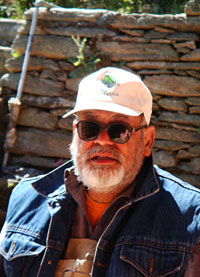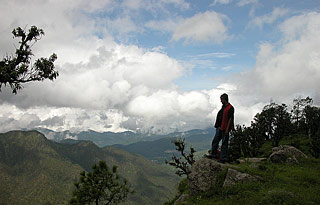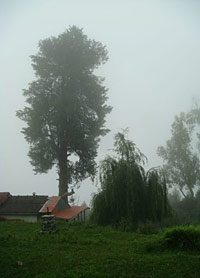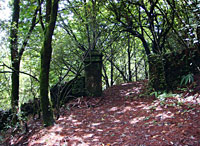There have been several articles
and reviews written about Jilling Estate, not just in travel books,
magazines and websites, but also by travellers who have found the
experience charming and different from the usual holiday getaways
that seem to have sprung up all over the countryside.
In addition to reviews in The
Hindu, and at many reputed travel websites, here are some
articles written by visitors to Jilling - giving you a firsthand
account of what you can expect on a trip here.
Jilling out with Steve by Jug Suraiya | The
Last Resort by Bharati Motwani
Ex-fighter pilot and former tea planter, 58-year-old Steve Lall is
today a retailer of the country's most priceless and endangered
commodity. Together with his wife Parvati, he zealously guards his
product for an exclusive clientele who come to sample it at Jilling:
45 acres of densely wooded Kumaun hillside, 6,500 feet above sea
level, 300 km from Delhi and 38 km from the rail head at Kathgodam.

Cloaked in a lush, multicultural forest of oak and chestnut and
deodar, with brief but bewitching views of Nanda Devi, Jilling is
part of the erstwhile Stiffles estate and was bought in 1965 by
Steve's mother who is said to have got it for the price of a
second-hand car. Taken together with the contiguous tracts owned by
neighbours, Jilling runs to some 140 acres of a customised Eden, a
perfect place for chilling out. Scattered over the hillside at
discreet intervals are four wood and stone cottages, simply but
comfortably furnished, for visitors. Natural trails ramble through
the woods, inviting exploration: from the seven-km-long, level
Lovers' Walk, to steeper hikes that lead up to the ridge from where
the valley on the farther side falls away in an escarpment as sudden
and swift as the swoop of a falcon.
There is good, wholesome home cooking, eclectically crammed
bookshelves to browse through, and, in the evening, blazing bonfires
spiralling sparks into star-filled skies. There are no telephones,
no TV, no cars. This is the secret of Steve's unique product, which
is silence.
In a world where frenetic movement is mistaken for progress,
strident rhetoric for the inflexion of discourse, it is Jilling's
silence that sets it apart. Last week when Bunny and I spent three
days there, I sat on the sunlit lawn outside our cottage and
listened to the silence.
The first thing that strikes you about silence is that it is not an
absence of sound, for that would make it a sterile vacuum.  Listening
to silence is like watching a glass being filled with water, drop by
careful drop. When the glass is full, the water brims over the top
without spilling, the convex curve of liquid held in place like a
drawn bowstring. The silence I listened to at Jilling was like that
resonant arc, a supple filament that strung together the ratcheting
feathers of a partridge in flight, the sharp call of a barking deer,
the leafy conversation of trees, the bubbles of air exploding in the
bottle of soda on the table.
Listening
to silence is like watching a glass being filled with water, drop by
careful drop. When the glass is full, the water brims over the top
without spilling, the convex curve of liquid held in place like a
drawn bowstring. The silence I listened to at Jilling was like that
resonant arc, a supple filament that strung together the ratcheting
feathers of a partridge in flight, the sharp call of a barking deer,
the leafy conversation of trees, the bubbles of air exploding in the
bottle of soda on the table.
I realised that the silence was a gift as fragile as the finest
porcelain, as evanescent as the shimmer of a butterfly's wings. Like
most gifts worth the getting, or the giving, Jilling's silence is
hard won; it is based on uncompromising solitude. The nearest
motorable road is two kilometres away, where guests can park their
cars. From there it is a brisk 40-minute climb to Jilling; for those
faint of limb or heart, ponies or palkies are provided.
Jilling's deliberate isolation has kept at bay what Steve calls the
'tootak, tootak tootian' Marutised holiday-makers from the plains.
If anyone tries to build a road up here, I'll shoot the bugger, says
Steve in what is surely a joke -- I think.  He is similarly
adamant about forest conservation. He is convinced that aforestation
programmes, based on quick-growing species like pine, have resulted
in monocultural man-made forests which eventually deplete the soil
and lead to the catastrophe of topsoil erosion and the environmental
degradation sweeping our hills. Steve believes in a policy of
non-intervention, of allowing the natural medley of the forest to
rejuvenate itself through the unforced diastole and systole of its
own great green beating heart.
He is similarly
adamant about forest conservation. He is convinced that aforestation
programmes, based on quick-growing species like pine, have resulted
in monocultural man-made forests which eventually deplete the soil
and lead to the catastrophe of topsoil erosion and the environmental
degradation sweeping our hills. Steve believes in a policy of
non-intervention, of allowing the natural medley of the forest to
rejuvenate itself through the unforced diastole and systole of its
own great green beating heart.
But despite its solitude and Steve's ecological evangelism, there is
nothing sombre or sanctimonious about Jilling's bracing air, infused
with the rich earthiness of the village community living on its
periphery and in perfect harmony with it. Tara Devi, a sprightly
widow and mother of 10, drops in while we are there. She reports a
rogue bear who has mauled two women cutting grass, and almost in the
same breath mentions a daughter-in-law who is getting fat, an
ominous sign of indulgence. She herself is well, except that try as
she might she can not achieve a bowel movement more than once a
week. I suggest that she drink a bottle of beer daily to ease her
malady. The thought of drinking Angrezi sharab at 65 rupees a bottle
makes Tara Devi cackle so hard that she swears that the demon
gripping her innards has been exorcised straightaway
A baby barking deer -- all huge, liquid eyes, velvet button of a
nose and twitching ears, Bambi incarnate -- is found by a grass
cutter and brought to Jilling.
The mother has probably been taken by a leopard, of whom there are
at least three in the area.  A spirited debate
ensues, the fate of the fawn in the balance. No-nonsense Steve is
all for putting it back in the forest, letting nature take its
course. Parvati and his daughter, Nandini, are equally vehement
about harbouring the waif till it can find its adult feet in the
wild. Fortunately, as is usual in the hills, the womenfolk have
their way. Steve grumbles but looks pleased as punch.
A spirited debate
ensues, the fate of the fawn in the balance. No-nonsense Steve is
all for putting it back in the forest, letting nature take its
course. Parvati and his daughter, Nandini, are equally vehement
about harbouring the waif till it can find its adult feet in the
wild. Fortunately, as is usual in the hills, the womenfolk have
their way. Steve grumbles but looks pleased as punch.
When it's time to leave, Bunny and I are not in the least sad. Quite
the contrary. For we know, deeper than any words, that having once
experienced Jilling and its silence we can never really leave it,
but will return again and again. Our goodbye is also a greeting.
That's all very well, but how the hell does one actually get there?
Well, that's just it you see. Jilling as I said is a gift. And as a
gift, you can't just go there and claim it; you have to wait till
it's given to you, when you've earned it. And once you have, let
others also earn it for themselves.
Remember: to ensure Jilling's code of silence which makes it
incomparable, mum's the word.
Read 'The Last Resort' by Bharati Motwani


